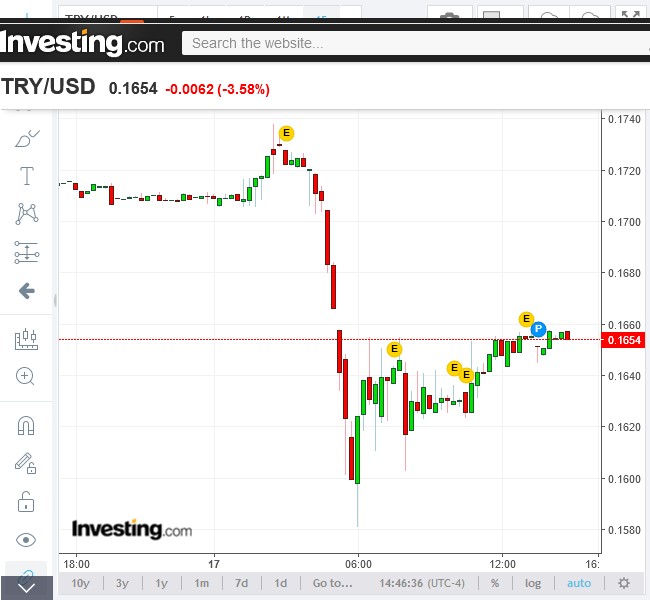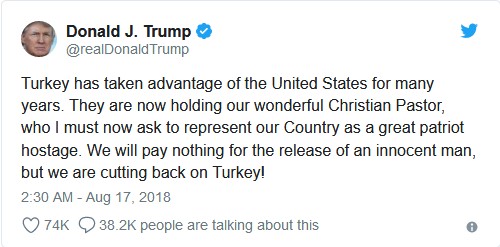Economic and financial crises have a way of making investors appreciate the role of gold as a safe haven asset. Although this tends to be most noticeable when it’s happening on a global scale, regional and even national financial crises can have remarkable effects on gold demand and prices albeit at a more localized level.
This is already clearly evident in Iran where local gold prices have soared more than ten percent after the first round of American sanctions took effect this week. That’s despite global gold prices having plunged by an almost similar magnitude in the year-to-date.
And now you can add Turkey to the growing list of countries that are going contrary to the global gold selloff. Gold trading volumes in the country have doubled as a massive currency crisis continues to bite. The Turkish lira has plunged more than 40 percent against the U.S. dollar, forcing people to park more of their wealth in the yellow metal.
Gold futures volumes on the Borsa Itsnabul have surged, with the 90-day average daily volume having more than doubled to 40,000 contracts, a sharp rise compared to 17,000 contracts that changed hands everyday in the month of March. Meanwhile, the value of an ounce of gold in lira has climbed more than 30 percent in Turkish lira.
Maybe you can partly chalk that up to President Recep Tayyip Erdogan who has reversed his 2016 call by urging his subjects to sell gold and buy the lira instead.

(Click to enlarge) The World FactBook ranked Turkey as having the 24th largest gold and forex reserves by the end of 2016.
Lira’s gains short-lived
Gold trading in Turkey is likely to remain at elevated levels if their lira’s latest theatrics are any indications.
Related: Sealing Off The North Korea Smuggling Loophole
The lira soared 7.5 percent yesterday, the best one-day gain on more than year, after Qatar pledged to advance the country loans worth $15 billion while the Turkish government imposed new rules that made it harder to short the currency. But just a day later, the lira is giving back its gains, slumping 3.6 percent against the greenback. The sharp slide has come despite the fact that the dollar index is down half a percentage point on the day.

(Click to enlarge)
Source: Investing.com
The highly volatile lira is once again reacting to the turn of political events. The Turkish court rejected an appeal for release by American pastor Andrew Brunson who is under house arrest in the country for alleged terrorism activities. President Trump reacted immediately by tweeting that the U.S. will pay nothing for the release of the pastor but would instead retaliate with heavier tariffs.
U.S. Treasury Secretary Steven Mnuchin has already assured Trump that the U.S. would impose more sanctions on Turkey if Brunson is not freed.

(Click to enlarge)
"We have more that we are planning to do if they don't release him quickly," Mnuchin said during a cabinet meeting.
Related: This Tech Giant Is Pushing For Blockchain Adoption
The United States has slapped two Turkish government ministers with sanctions and also doubled tariffs of steel and aluminum imports from the country.
The diplomatic row between the two nations is worsening investor confidence that has already been stretched by Turkey’s long-standing fundamental economic challenges. In recent years, the country has amassed high levels of foreign debt in a bid to fuel economic growth, and the lira’s meltdown now makes it a lot harder to pay off the dollar-denominated loans.
Indeed, many economists now worry that a recession might not be far off. Meanwhile, President Recep Tayyip Erdogan's has consistently objected to the central bank hiking local interest rates as experts advice it should.
The bottom line: there’s no easy way back for the beleaguered lira.
By Alex Kimani for Safehaven.com
More Top Reads From Safehaven.com
















